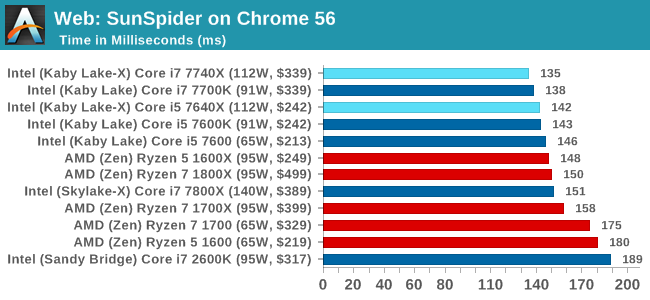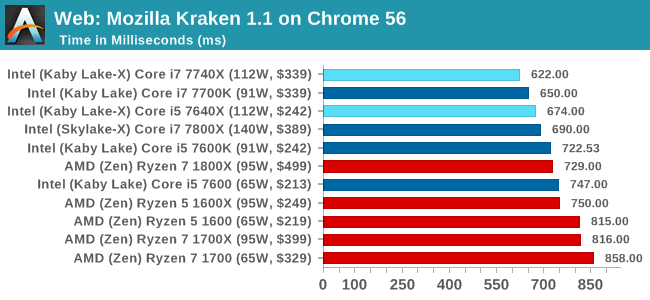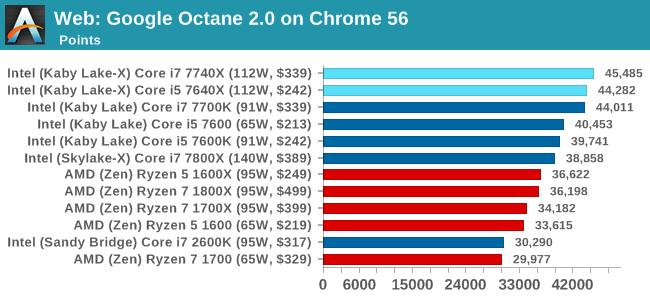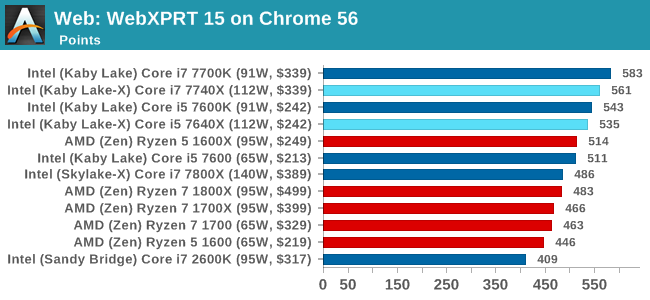The Intel Kaby Lake-X i7 7740X and i5 7640X Review: The New Single-Threaded Champion, OC to 5GHz
by Ian Cutress on July 24, 2017 8:30 AM EST- Posted in
- CPUs
- Intel
- Kaby Lake
- X299
- Basin Falls
- Kaby Lake-X
- i7-7740X
- i5-7640X
Benchmarking Performance: CPU Web Tests
One of the issues when running web-based tests is the nature of modern browsers to automatically install updates. This means any sustained period of benchmarking will invariably fall foul of the 'it's updated beyond the state of comparison' rule, especially when browsers will update if you give them half a second to think about it. Despite this, we were able to find a series of commands to create an un-updatable version of Chrome 56 for our 2017 test suite. While this means we might not be on the bleeding edge of the latest browser, it makes the scores between CPUs comparable.
All of our benchmark results can also be found in our benchmark engine, Bench.
SunSpider 1.0.2: link
The oldest web-based benchmark in this portion of our test is SunSpider. This is a very basic javascript algorithm tool, and ends up being more a measure of IPC and latency than anything else, with most high-performance CPUs scoring around about the same. The basic test is looped 10 times and the average taken. We run the basic test 4 times.

SunSpider has a single threaded focus, and we see the Kaby Lake-X processors take their spots at the top of the graph.
Mozilla Kraken 1.1: link
Kraken is another Javascript based benchmark, using the same test harness as SunSpider, but focusing on more stringent real-world use cases and libraries, such as audio processing and image filters. Again, the basic test is looped ten times, and we run the basic test four times.

Mozilla too relies on single threaded IPC and frequency.
Google Octane 2.0: link
Along with Mozilla, as Google is a major browser developer, having peak JS performance is typically a critical asset when comparing against the other OS developers. In the same way that SunSpider is a very early JS benchmark, and Kraken is a bit newer, Octane aims to be more relevant to real workloads, especially in power constrained devices such as smartphones and tablets.

Octane is an interesting benchmark, requiring cores and ST performance, but mostly the latter. It also seems that either Intel's design is optimized for the benchmark or vice versa, given the substantial difference in performance. There's no way for the benchmark to use all of the threads from AMD, nor the 12 threads in the Core i7-7800X which has a lower single thread performance.
WebXPRT 2015: link
While the previous three benchmarks do calculations in the background and represent a score, WebXPRT is designed to be a better interpretation of visual workloads that a professional user might have, such as browser based applications, graphing, image editing, sort/analysis, scientific analysis and financial tools.

WebXPRT is a mix of ST and MT, but still based in the web and relies on ST performance a lot. Given the variable loading on the benchmark, Intel's newest features such as Speed Shift help keep it at the top.










176 Comments
View All Comments
Alistair - Monday, July 24, 2017 - link
I look at it this way: in 2016 I bought a 6600k for $350 CAD. In 2017 I bought a Ryzen 1700 for $350 CAD. Overall speed increase 240%. So AMD delivered 240 percent more performance at the same price in one year. Intel continues to deliver less than 10 percent per dollar. I could care less if the single performance is the same.Call me next time Intel releases a chip a year later that is 240 percent faster for the same price.
Hurr Durr - Monday, July 24, 2017 - link
So you bought yourself inferior IPC and a sad attempt at ameliorating it by piling up cores, and now have to cope with this through wishful thinking of never materializing performance percents. Classic AMD victim behavior.Alistair - Monday, July 24, 2017 - link
First of all, stop using IPC, an expression you don't understand. Use single core performance. In almost every single benchmark I see dramatic speed improvements. I'm comparing the i5 with a Ryzen 1700 as they were the same cost. People harping over the i7-7700k apparantly didn't notice the 1700 selling for as low as $279 USD.Also get higher fps in almost every single game (Mass Effect Andromeda, Civilization and Overwatch in particular).
Alistair - Tuesday, July 25, 2017 - link
I have tremendous respect for Ian, whose knowledge and integrity is of the highest order. I just think some of his words in this review lose the plot. As he said, "it would appear Intel has an uphill struggle to convince users that Kaby Lake-X is worth the investment". He should have emphasized that a little more.In Canada, Ryzen 1700 plus motherboard = $450. i5 (not i7) plus motherboard is $600. Yes, $150 dollars more!
Intel has 20 percent faster single core performance and yet Ryzen is 2.4 times (+140 percent) faster overall... Numbers should speak for themselves if you don't lose the plot. I agree single threaded performance is very important when the divergence is large, such as Apple's A10 vs Snapdragon 835, or the old Bulldozer. But the single threaded gap has mostly closed and a yawning gulf has opened up in total price/performance. Story of the year!
Hurr Durr - Tuesday, July 25, 2017 - link
Extolling price slashing right after launch, boy you`re on a roll today.silverblue - Tuesday, July 25, 2017 - link
I think you should prove why you think Intel is the superior buy, instead of just trolling and not actually providing any rationale behind your "arguments".On Amazon.co.uk right now, there are four Ryzen and one FX CPU in the top 10. Here's the list (some of the recommended retail price values are missing or a bit - in the case of the 8350 - misleading):
1) i7-7700K £308.00; RRP £415.99
2) R5 1600 £189.19; RRP £219.95
3) R7 1700 £272.89; RRP £315.95
4) i5-7600K £219.99; RRP £?
5) i5-7500 £173.00; RRP £?
6) FX-8350 £105.50; RRP £128.09
7) i5-6500 £175.09; RRP £?
8) R5 1500X £165.99; RRP £189.98
9) Pentium G4400 £48.90; RRP £?
10) R5 1600X £215.79; RRP £249.99
There must be a ton of stupid people buying CPUs now then, or perhaps they just prefer solder as their thermal interface material of choice.
Advantages for Intel right now: clock speed; overclocking headroom past 4 GHz; iGPU (not -X CPUs)
Disadvantages for Intel right now: price; limited availability of G4560; feature segmentation (well, that's always been a factor); overall platform cost
An AMD CPU would probably consume similar amounts of power if they could be pushed past 4.1GHz so I won't list that as a disadvantage for Intel, nor will I list Intel's generally inferior box coolers as not every AMD part comes with one to begin with.
The performance gap in single threaded workloads at the same clock speed has shrunk from 60%+ to about 10%, power consumption has tumbled, and it also looks like AMD scales better as more cores are added. Unless you're just playing old or unoptimised games, or work in a corporate environment where money is no object, I don't see how AMD wouldn't be a viable alternative. That's just me, though - I'm really looking forward to your reasons.
Gothmoth - Tuesday, July 25, 2017 - link
no first of = stop arguing with stupid trolls...prisonerX - Monday, July 24, 2017 - link
I can double my IPC by having another core. Are you really that dumb?Hurr Durr - Tuesday, July 25, 2017 - link
AMD victim calling anyone dumb is peak ironing. You guys are out in force today, does it really hurt so bad?wira123 - Tuesday, July 25, 2017 - link
yeah intel victim is in full force as well today, which is indeed ironic